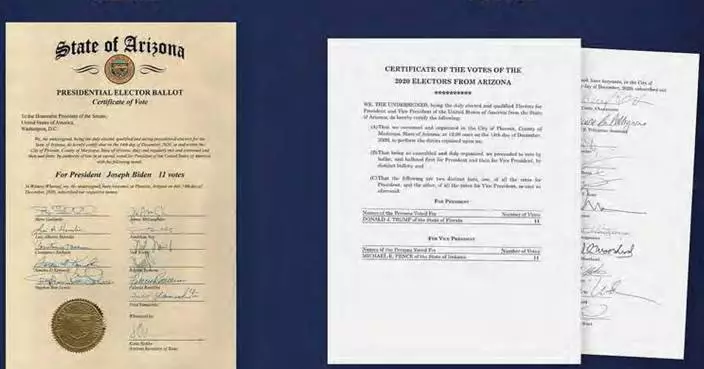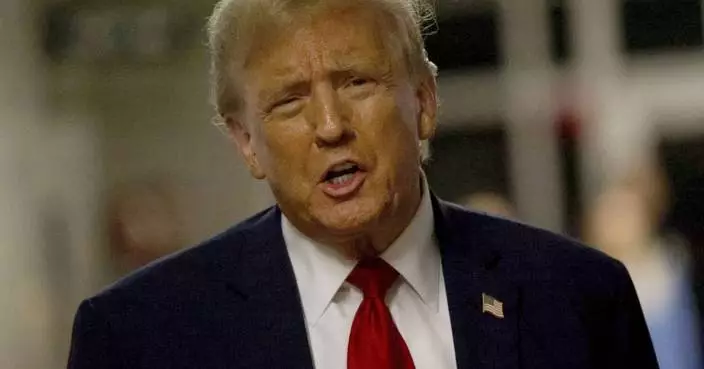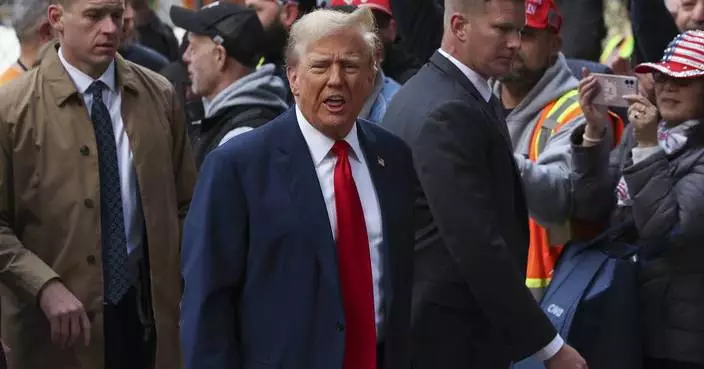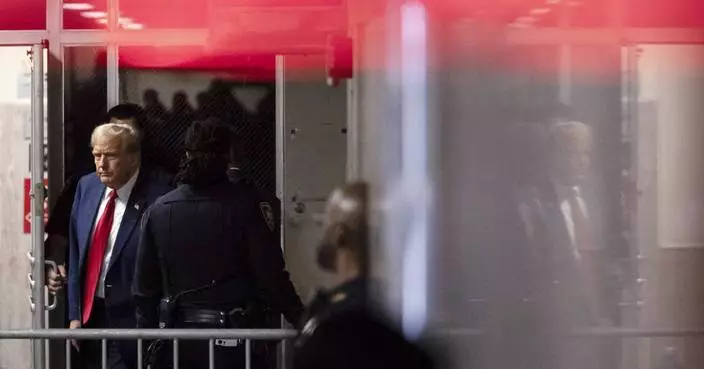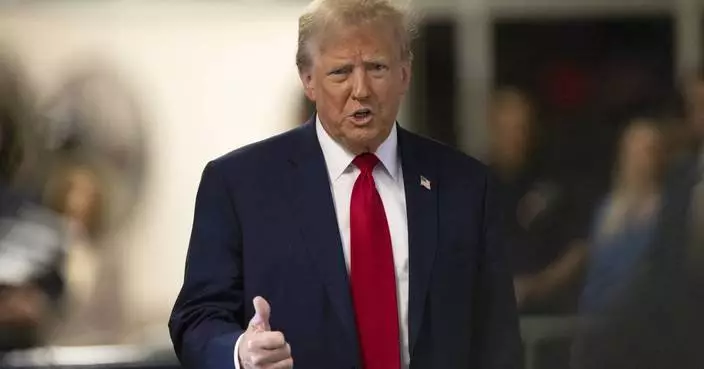President Donald Trump on Thursday abruptly canceled his summit with North Korea's Kim Jong Un, blaming "tremendous anger and open hostility" by Pyongyang — a decision North Korea called "regrettable" while still holding out hope for "peace and stability."
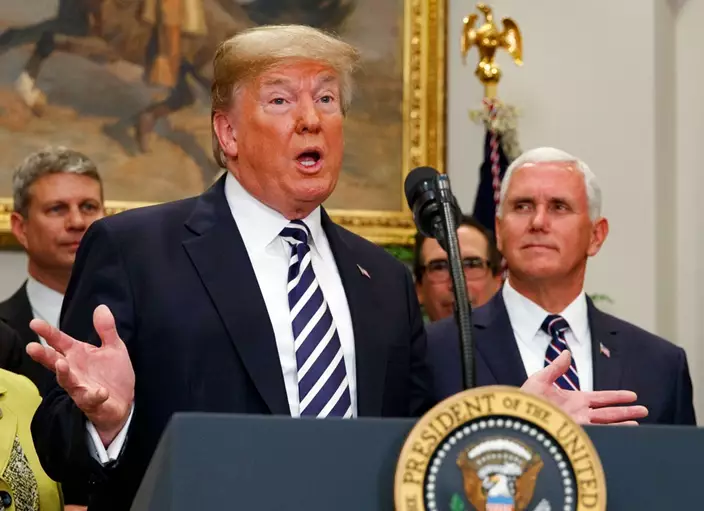
President Donald Trump speaks during a signing ceremony for the "Economic Growth, Regulatory Relief, and Consumer Protection Act," in the Roosevelt Room of the White House, Thursday, May 24, 2018, in Washington, as Vice President Mike Pence looks on, right. In a dramatic diplomatic turn, Trump on Thursday canceled next month's summit with North Korea's Kim Jong Un, citing the "tremendous anger and open hostility" in a recent statement by the North. (AP Photo/Evan Vucci)
In a letter to Kim announcing his decision to back away from the June 12 summit, Trump pointed to America's vast military might and warned the rising nuclear power against any "foolish or reckless acts."
Click to Gallery
President Donald Trump on Thursday abruptly canceled his summit with North Korea's Kim Jong Un, blaming "tremendous anger and open hostility" by Pyongyang — a decision North Korea called "regrettable" while still holding out hope for "peace and stability."
In a letter to Kim announcing his decision to back away from the June 12 summit, Trump pointed to America's vast military might and warned the rising nuclear power against any "foolish or reckless acts."
Vice Foreign Minister Kim Kye Gwan called Trump's decision "unexpected" and "very regrettable," and said the cancellation of the talks shows "how grave the status of historically deep-rooted hostile North Korea-U.S. relations is and how urgently a summit should be realized to improve ties."
Russian President Vladimir Putin, a staunch Kim ally, said the North Korean leader had in fact done "everything that he had promised in advance, even blowing up the tunnels and shafts" of his country's nuclear testing site. Putin said of Trump's announcement, "In Russia we took this news with regret."
Trump, who considers himself a master dealmaker, has confounded aides and allies at every turn of the fateful flirtation with the North. He looked past the warnings of senior aides when he accepted Kim's invitation to meet back in March. He unveiled the date and the time with characteristic showmanship. And after initially projecting calm in the face of North Korea's escalating rhetoric, he made a sudden about face, though his letter also waxed poetic about the "wonderful dialogue" emerging between the two leaders.
The letter kicked off a day of mixed messages by the president, who declared hours later, "I really believe Kim Jong Un wants to do what's right." After that, a senior White House official said the North lacked judgment and had reneged on its promises ahead of the summit. Trump said from the White House that a "maximum pressure campaign" of economic sanctions and diplomatic isolation would continue against North Korea — with which the U.S. is technically still at war — but he added that it was possible the summit could still take place at some point.
North Korea issued a statement Friday saying it is still "willing to give the U.S. time and opportunities" to reconsider talks "at any time, at any format."
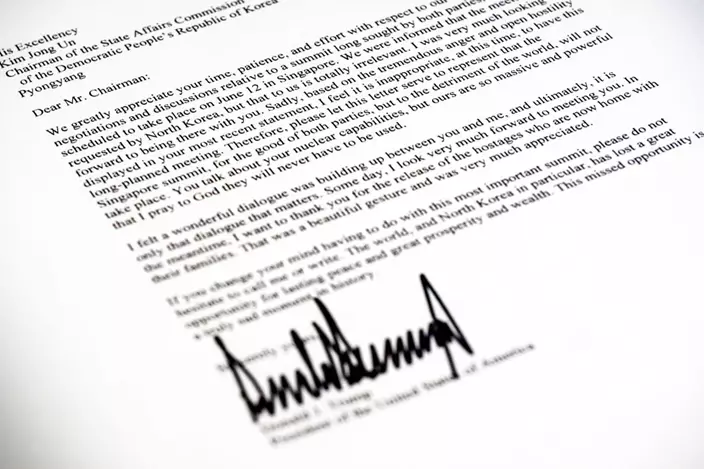
A copy of the letter sent to North Korean leader Kim Jong Un from President Donald Trump canceling their planned summit in Singapore is photographed in Washington, Thursday, May 24, 2018. (AP Photo/J. David Ake
Vice Foreign Minister Kim Kye Gwan called Trump's decision "unexpected" and "very regrettable," and said the cancellation of the talks shows "how grave the status of historically deep-rooted hostile North Korea-U.S. relations is and how urgently a summit should be realized to improve ties."
Kim insisted North Korea's "objective and resolve to do our best for the sake of peace and stability of the Korean Peninsula and all humankind remain unchanged."
Trump's surprise exit capped weeks of high-stakes brinkmanship between the two unpredictable leaders over nuclear negotiating terms for their unprecedented sit-down. The U.S. announcement came not long after Kim appeared to make good on his promise to demolish his country's nuclear test site. But it also followed escalating frustration — and newly antagonistic rhetoric — from North Korea over comments from Trump aides about U.S. expectations for the North's "denuclearization."
The senior U.S. official said the North violated a pledge to allow international inspectors to monitor the supposed implosion of the site Thursday. International journalists were present, but the U.S. government can't verify the site's destruction. The official spoke on the condition of anonymity to avoid overshadowing Trump's comments Thursday.
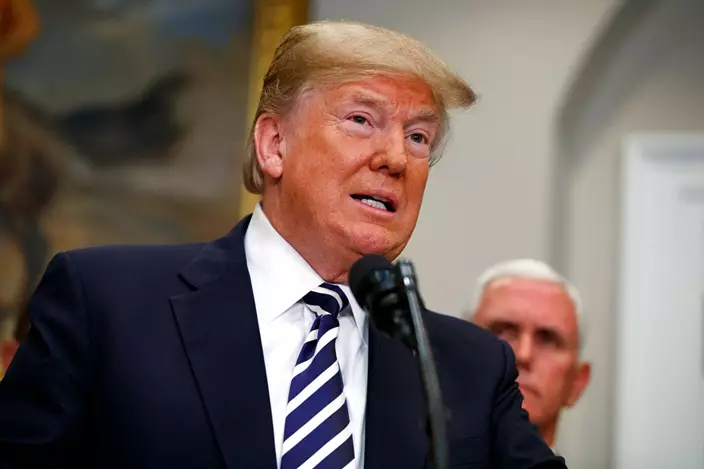
President Donald Trump speaks on North Korea before signing the "Economic Growth, Regulatory Relief, and Consumer Protection Act," in the Roosevelt Room of the White House, Thursday, May 24, 2018, in Washington (AP Photo/Evan Vucci)
Russian President Vladimir Putin, a staunch Kim ally, said the North Korean leader had in fact done "everything that he had promised in advance, even blowing up the tunnels and shafts" of his country's nuclear testing site. Putin said of Trump's announcement, "In Russia we took this news with regret."
Japan says it understands President Donald Trump's cancellation of the summit with the North Korean leader. Top officials there say talks should be held when progress on the North's denuclearization is achieved.
Trump, in his letter to Kim, objected specifically to a statement from a top North Korean Foreign Ministry official. That statement referred to Vice President Mike Pence as a "political dummy" for his comments on the North and said it was up to the Americans whether they would "meet us at a meeting room or encounter us at nuclear-to-nuclear showdown."
Underscoring the high stakes, Trump said he had spoken with military leaders, as well as Japan and South Korea, and stressed that the United States was prepared for any threat.
Still, Trump's announcement appeared to surprise South Korea, which had pushed to keep the summit on track as recently as Tuesday, when President Moon Jae-in met with Trump in the Oval Office and said the "fate and the future" of the Korean Peninsula hinged on the talks. The Blue House said Thursday that it was trying to figure out Trump's intentions in canceling the summit.
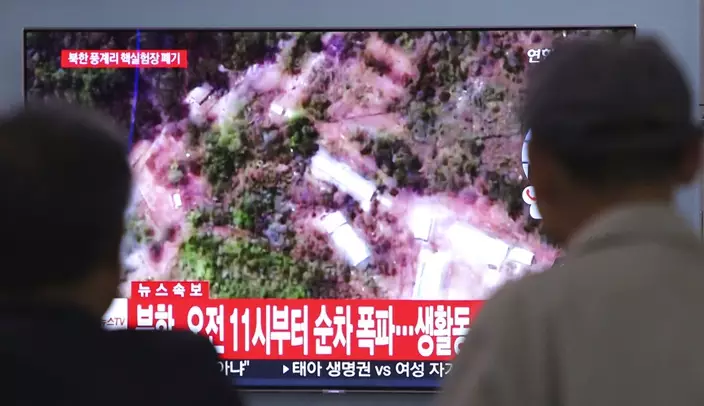
People watch a TV screen showing a satellite image of the Punggye-ri nuclear test site in North Korea during a news program at the Seoul Railway Station in Seoul, South Korea, Thursday, May 24, 2018. North Korea carried out what it said is the demolition of its nuclear test site Thursday, setting off a series of explosions over several hours in the presence of foreign journalists. The signs read: " North Korea demolishes nuclear test site at 11 AM." (AP Photo/Ahn Young-joon)
Trump, who considers himself a master dealmaker, has confounded aides and allies at every turn of the fateful flirtation with the North. He looked past the warnings of senior aides when he accepted Kim's invitation to meet back in March. He unveiled the date and the time with characteristic showmanship. And after initially projecting calm in the face of North Korea's escalating rhetoric, he made a sudden about face, though his letter also waxed poetic about the "wonderful dialogue" emerging between the two leaders.
Wrote Trump: "If you change your mind having to do with this most important summit, please do not hesitate to call me or write."
It was unclear whether Trump's move marked a negotiating ploy or a manifestation of mounting internal concerns over ensuring a successful outcome for the summit.
Trump was briefed Wednesday night and made the decision to exit Thursday morning after consulting with top advisers, including Secretary of State Mike Pompeo and National Security Adviser John Bolton, to whom he dictated the letter, said the senior official.
The question now is how Trump's maneuvering will be received. His letter could make the situation worse in a society where saving face can be pivotal. Kim might well take offense at the hardnosed U.S. approach after he released American detainees and destroyed a nuclear site.
Trump's aides had warned that merely agreeing to the summit had provided Kim with long-sought international legitimacy and, if Trump ultimately backed out, risked fostering the perception that the president was insufficiently committed to diplomatic solutions to the nuclear question.
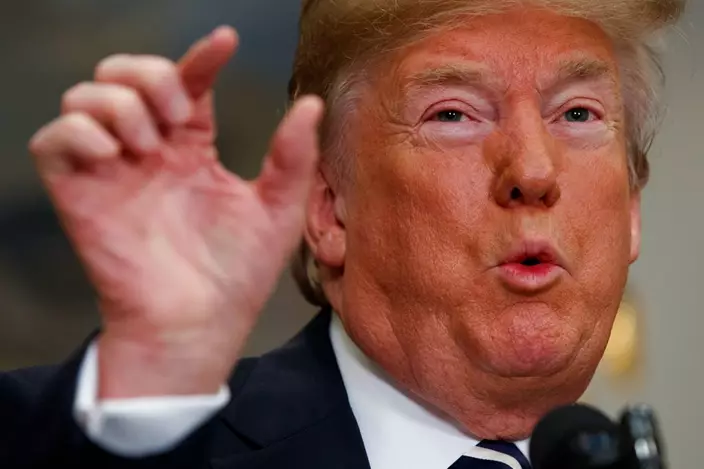
President Donald Trump speaks about North Korea before signing the "Economic Growth, Regulatory Relief, and Consumer Protection Act," in the Roosevelt Room of the White House, Thursday, May 24, 2018, in Washington (AP Photo/Evan Vucci)
U.S. defense and intelligence officials have repeatedly assessed the North to be on the threshold of having the capability to strike anywhere in the continental U.S. with a nuclear-tipped missile — a capacity that Trump and other U.S. officials have said they would not tolerate.
Pompeo, testifying on Capitol Hill, said North Korea had not responded to repeated requests from U.S. officials to discuss logistics for the summit. He told the Senate Foreign Relations Committee the lack of response was an additional reason for Trump's decision.
"We got a lot of dial tones, Senator," he told committee chairman Bob Corker.
A White House team was set to fly to Singapore this weekend to continue logistical planning for the meeting.
Pompeo said the North's posture had changed markedly since he returned from Pyongyang earlier this month, a trip during which he met with Kim and oversaw the release of three Americans being held. Trump suggested this week that China was to blame for "a little change" in Kim's attitude. Kim paid a secret visit to his primary ally just before Pompeo's visit, and China is wary of any shift in the balance of power on the Korean peninsula.
Trump's allies in Congress applauded the president, saying he was justified in pulling out of the meeting.
"North Korea has a long history of demanding concessions merely to negotiate. While past administrations of both parties have fallen for this ruse, I commend the president for seeing through Kim Jong Un's fraud," said Sen. Tom Cotton, R-Ark.
Critics were less impressed.
House Minority Leader Nancy Pelosi, D-Calif., said it was clear Trump "didn't know what he was getting into and now he's walking away" in a "very chummy, palsy-walsy letter" that's "kind of like a valentine to Kim Jong Un."
White House officials have privately predicted for weeks that the summit could be canceled once or twice before actually taking place. Trump has seemed to welcome chatter of a Nobel Peace Prize, but that has yielded in recent weeks to the sobering prospect of ensuring a successful outcome with the Kim.
NEW YORK (AP) — Rooting for Donald Trump to fail has rarely been this profitable.
Just ask a hardy band of mostly amateur Wall Street investors who have collectively made tens of millions of dollars over the past month by betting that the stock price of his social media business — Truth Social — will keep dropping despite massive buying by Trump loyalists and wild swings that often mirror the candidate’s latest polls, court trials and outbursts on Trump Social itself.
Several of these investors interviewed by The Associated Press say their bearish gambles using “put” options and other trading tools are driven less by their personal feelings about the former president (most don’t like him) than their faith in the woeful underlying financials of a company that made less money last year than the average Wendy’s hamburger franchise.
“This company makes no money. ... It makes no sense," said Boise, Idaho, ad executive Elle Stange, who estimates she’s made $1,300 betting against Trump Media & Technology stock. “He's not as great a businessman as he thinks. A lot of his businesses go belly up, quickly.”
Says Seattle IT security specialist Jeff Cheung, “This is guaranteed to go to zero.”
As of Friday morning, a month since Trump Media’s initial public offering sent its stock to $66.22, it has plunged to $38.49. An AP analysis of data from research firms FactSet and S3 Partners shows that investors using puts and “short selling” have paper profits so far of at least $200 million, not including the costs of puts, which vary from trade to trade.
Still, amateur traders, mostly risking no more than a few thousand dollars each, say the stock is too volatile to declare victory yet. So they are cashing in a bit now, letting other bets ride and stealing a glance at the latest stock movements in the office cubicle, at the kitchen table or even on the toilet.
There have been plenty of scary moments, including last week when DJT, the ex-president’s initials and stock ticker, jumped nearly 40% in two days.
“I don’t know which direction the stock is going,” says Schenectady, N.Y., day trader Richard Persaud while checking his iPhone amid the surge. “It’s so unbelievably overvalued.”
Many who spoke to the AP say knowing their bets have helped slash the value of Trump’s 65% stake in half is an added political benefit. If some of their predictions are right, they may able to someday push it to zero, making it impossible for him to tap it to pay his hefty legal bills or finance his GOP presidential campaign.
They have a long way to go. Trump’s stake is still worth $4 billion.
Normally, investors betting a stock will fall, especially a gutsy breed of hedge fund traders called “short sellers,” will do plenty of homework. They’ll pore over financial statements, develop expertise in an industry, talk to competitors, and even turn to “forensic accountants” to find hidden weaknesses in the books.
No need in Trump Media’s case. It’s all there in the Sarasota, Florida-based company's 100-page financial report: A firehose of losses, $58 million last year, on minuscule revenue of $4 million from advertising and other sources.
The losses are so big, as Trump Media’s auditor wrote in the report, they “raise substantial doubt about its ability to continue as a going concern.”
A short seller’s dream? Or is it a nightmare?
Amateur trader Manny Marotta has two computer screens at home, one for work, the other showing DJT stock's movements where he can gauge how much he’s up or down.
It wasn’t looking so good earlier this week.
The legal writer from suburban Cleveland had been up about $4,000 on “put” options purchased over the past few weeks. But the screen that morning was showing investors, presumably rich ones, buying large volumes of DJT shares, pushing up the stock once again.
“My options are worth less with every passing minute,” says Marotta, adding about DJT: “It’s being manipulated. It’s insane.”
Waiting for the stock to drop is especially painful to “short sellers,” who pay a fee to borrow shares owned by others. The idea is to quickly sell them on a hunch then they will be able to buy the same number of them later for much cheaper before having to return them to the lender. That allows short sellers to pocket the difference, minus the fee, which is usually nominal.
In DJT’s case, the fee is anything but nominal.
It was costing 565% a year at one point earlier this month, meaning short sellers had only two months before any possible profits would be eaten up in fees, even if the stock went to zero. It’s a rate so off the charts, that only three other stocks in recent memory have exceeded it, according to data from Boston University’s Karl Diether and Wharton’s Itamar Drechsler, who have studied short selling back two decades.
Add in massive buying by Trump supporters who see it as a way to support their candidate, and losses could multiply fast.
“It’s scary,” says Drechsler, who likens buyers of Trump’s stock to unwavering sports fans. “It is everything that you hope that the stock market is not.”
Trump Media spokeswoman Shannon Devine said the company is in a “strong financial position” with $200 million in cash and no debt, and said the AP was “selecting admitted Trump antagonists.”
Another danger to the stock is a “short squeeze.” If the price rises sharply, it could set off a rush by short sellers who fear they’ve bet wrongly to return their borrowed shares right away and limit their losses. And so they start buying shares to replace the ones they borrowed and sold, and that very buying tends to work against them, sending the price higher, which in turn scares other short sellers, who then also buy, setting off a vicious cycle of price hikes.
“If DJT starts rallying, you’re going to see the mother of all squeezes,” says S3 Partners short-selling expert Ihor Dusaniwsky, who spent three decades at Morgan Stanley helping investors borrow shares. “This is not for the faint of heart.”
And if that wasn’t enough, there is a final oddball feature of DJT stock that could trigger an explosion in prices, up or down.
“Lock up” agreements prohibit Trump and other DJT executives from selling their shares until September. That leaves the float, or the number of shares that can be traded each day by others, at a dangerously tiny 29% of total shares that will someday flood the market. That means a big purchase or sale on any day that would barely move a typical stock can send DJT flying or crashing.
The float is smaller than that of most other notoriously volatile stocks. At their smallest levels, AMC, GameStock and Shake Shack each had more than double the float.
Seattle trader Cheung sees DJT’s freak characteristics as a reason to bet against the stock, not shy away. When the lock-up period ends, he predicts, the ex-president will indeed sell his shares, spooking the market and sending the price down sharply. And even if he doesn’t, other insiders whose lock-ups expire will fear he will do so and will move fast to get a good price before it falls.
“The first one to sell out is going make to most, ” Cheung says. “Everyone is going to sell.”
Still, he doesn’t want to lose money in the interim, so Cheung is offsetting some of his “put” bets with the purchase of “calls.” The latter are also derivatives, but they do the opposite, paying off when the stock rises. Cheung hopes that whichever makes money, the puts or the calls, he will make enough with one to more than make up for the loss of the other.
If all of this seems too complicated, there is a far simpler way to make money betting against Trump.
Offshore, casino-style betting sites are taking wagers on the 2024 election, and some have even made President Joe Biden the favorite.
Contact AP’s global investigative team at Investigative@ap.org or https://www.ap.org/tips/
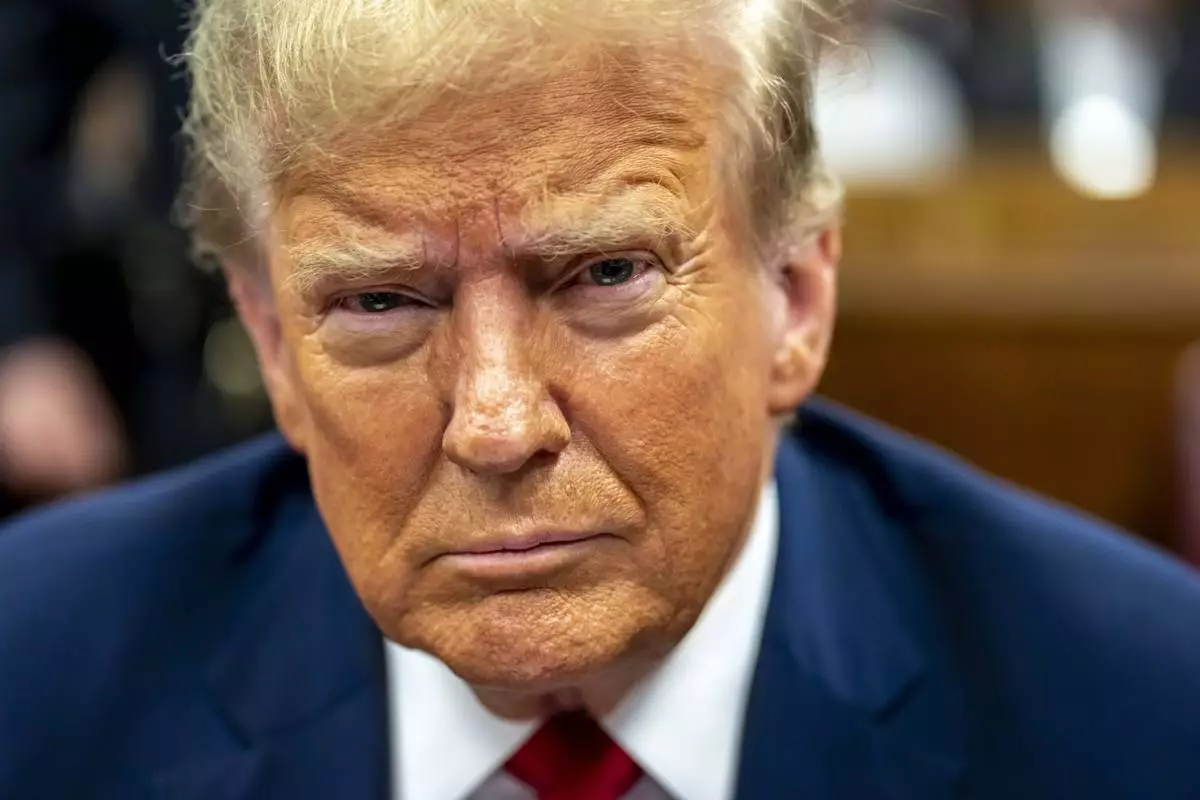
Former President Donald Trump sits in a courtroom in Manhattan criminal court, before the start of his trial on Thursday, April 25, 2024, in New York. (Mark Peterson/Pool Photo via AP)
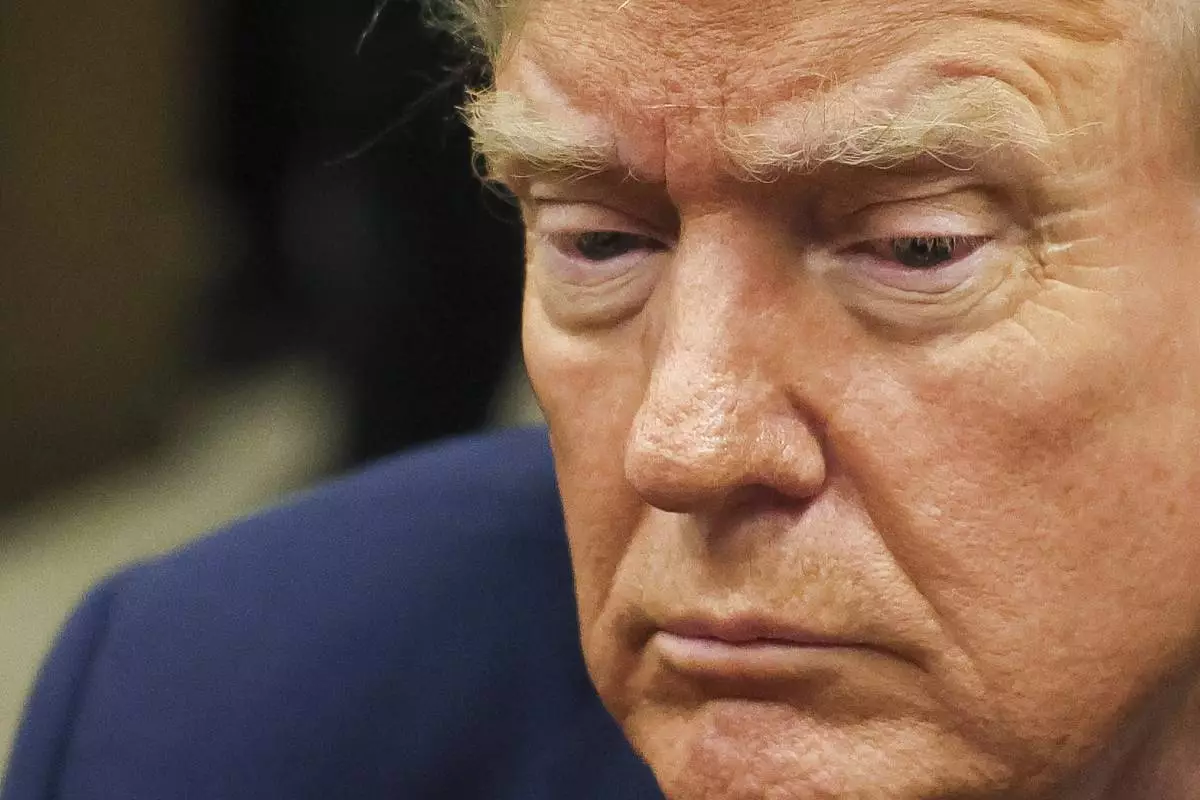
Republican presidential candidate and former President Donald Trump sits in Manhattan state court in New York, Monday, April 23, 2024. (Brendan McDermid/Pool Photo via AP)
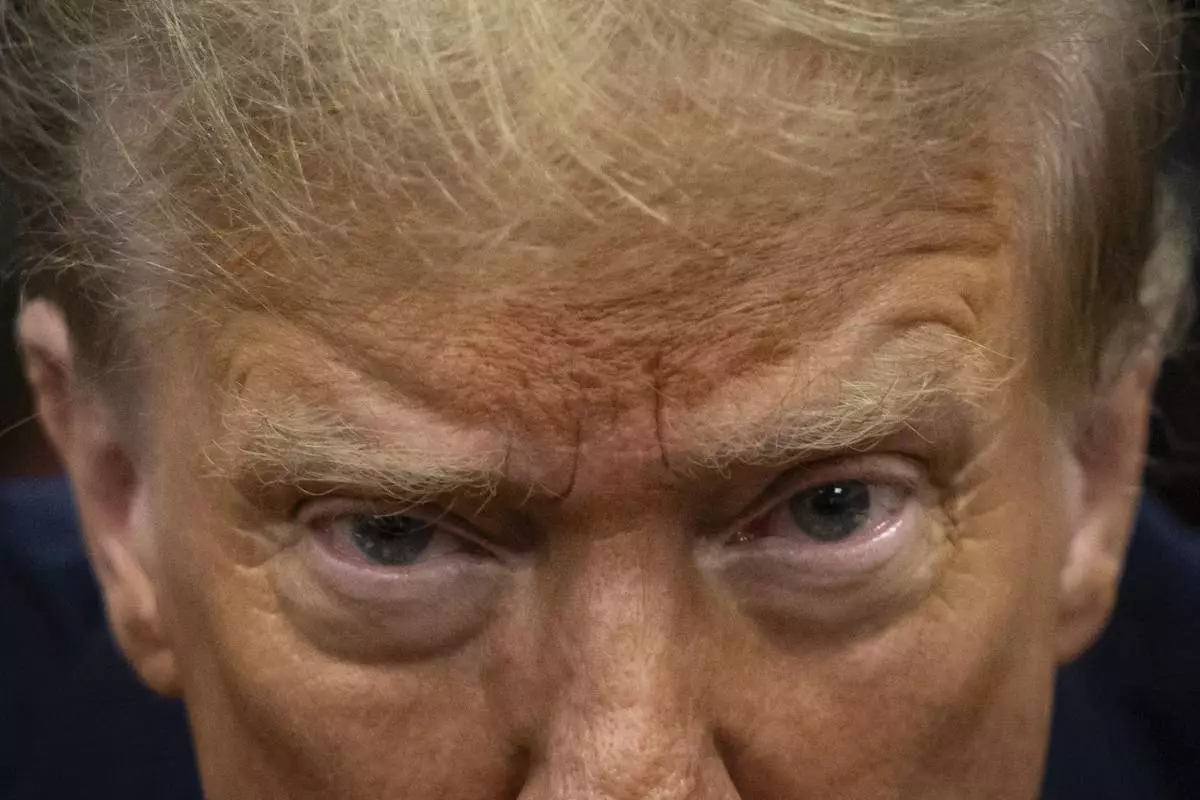
Former President Donald Trump waits for the start of proceedings in Manhattan criminal court, Tuesday, April 23, 2024, in New York. (AP Photo/Yuki Iwamura, Pool)











